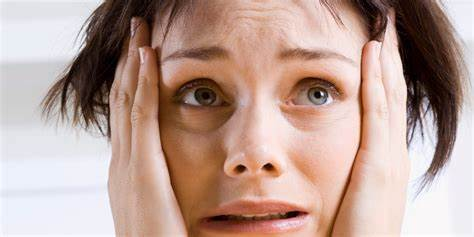We all go through stressful situations at some point in our lives. Anxiety is the feeling of impending danger, even when no real danger exists. This can lead to worry and a sense of unease. While anxiety can be mild and temporary, it can also be intense and frequent. This is often accompanied by sleep disturbance, a diagnostic symptom of anxiety disorders.
Anxiety is a mental health condition that can cause physical symptoms.
Anxiety is a mental health condition that can cause a combination of physical and psychological symptoms:
- Rapid heartbeats
- Shortness of breath
- Dizziness
- High body temperature
- Digestive disturbance (nausea and vomiting)
- Sleep disturbance
Anxiety is a complex condition with numerous features that can significantly impact one’s quality of life.
There are different types of anxiety, and they all affect emotions and feelings.
- Generalized anxiety disorder involves persistent and excessive worry about various topics, lasting at least six months.
- Panic attacks are brief episodes of intense fear and anxiety.
- Social anxiety is an extreme fear and phobia triggered by social settings or situations that could lead to embarrassment in front of others.
- Separation anxiety is an excessive fear of separation from loved ones or being alone.
- Obsessive-compulsive anxiety disorder is characterized by repetitive behavior that triggers fear and anxiety, such as checking, cleaning, and counting.
- Post-traumatic stress disorder (PTSD) is an anxiety disorder that can develop after a person has experienced a traumatic event, such as a car accident, physical or sexual assault, or military combat. Symptoms can include flashbacks, nightmares, and severe anxiety and can interfere with a person’s daily life.
Anxiety disorders are characterized by excessive fear and worry and related behavioral disturbances. World Health Organization (WHO)
The good news is that anxiety can be treated and controlled.
Anxiety is treatable and manageable, which means there is hope for struggling people. Being diagnosed with anxiety can be challenging, but with the proper treatment and support, you can overcome anxiety and live a fulfilling life.
The first treatments doctors recommend are anti-depressant medications and cognitive behavioral therapy, which involve learning relaxation techniques. However, some people may not prefer taking pills due to the fear of side effects, or they may find it challenging to cope with their daily life duties while taking medication. Additionally, some individuals may feel uncomfortable discussing their behavior with a therapist or have a busy schedule that prevents them from attending weekly therapy sessions.
So, what other options can help to cope with anxiety?
A healthy lifestyle approach and self-help meditating techniques can significantly improve mental health and reduce anxiety symptoms.
Mental health is a state of mental well-being that enables people to cope with the stresses of life, realize their abilities, learn well and work well, and contribute to their community. World Health Organization (WHO)
1. Exercise

Regular exercise can help reduce anxiety by stopping intense impulses in the nervous system and working on specific parts of the brain that trigger fear and anxiety.
You don’t have to be an athlete to begin exercising. Starting with moderate exercise, such as walking for 60 minutes or running for 20-30 minutes, four days a week can be beneficial. Additionally, you can try other physical activities like aerobics, dancing, swimming, football, or any other sport you enjoy to help alleviate anxiety symptoms. Whatever sport you choose, it will work its magic.
2. Yoga Meditation
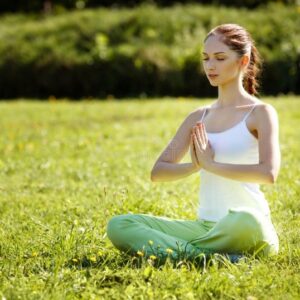
Yoga is a well-known practice for its ability to improve mental health. It involves physical postures, stretching, breathing control, and mind-body meditation. Practicing yoga regularly can help alleviate stress and anxiety, especially for those with obsessive-compulsive disorder. Mindfulness techniques and relaxation therapy, which are included in gentle yoga, can aid in eliminating negative thoughts that trigger anxiety. You can also incorporate yoga into your daily workout routine by performing 15 minutes of stretching at the end of your workout.
- Massage Therapy
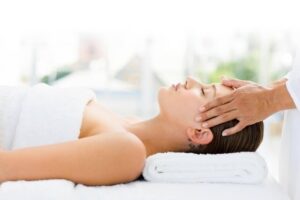
Therapeutic massage is becoming increasingly popular as an alternative treatment for anxiety. Massage therapy can help reduce cortisol levels and the stress hormones in the body and promote nervous system relaxation. Regular massage therapy can potentially help alleviate your anxiety symptoms. Investing in monthly massage sessions would be a good idea if you have the budget and time to spare.
- Acupuncture

Acupuncture has been proven effective in treating anxiety symptoms, with growing evidence supporting this claim. The procedure of acupuncture is well-tolerated and has minimal adverse events. Additionally, acupuncture can induce the release of serotonin, which is a mood-uplifting neurotransmitter. Suppose you’re interested in experiencing the benefits of acupuncture. In that case, you can look for an acupuncture facility in your area and determine if it’s a suitable treatment option.
- Herbal Medicine

Complementary medicine utilizes three therapies to treat anxiety symptoms: nutritional medication, herbal teas, and aromatherapy. Several studies have shown that when consumed in water-based beverages, the Kava plant can effectively reduce anxiety by inhibiting the triggers of fight neurotransmitter noradrenaline. However, it is essential to consume Kava with caution due to its liver toxicity.
Aromatherapy is an herbal treatment that can help with mild anxiety symptoms. Aromatherapy involves using herbal oil through inhalation or massage, which is considered a safer alternative. Other plants that ease anxiety include Bacopa, Ginkgo, Passionflower, Scullcap, Chamomile, and Lemon balm. It is essential to always consult with your doctor before trying any nutritional medications. However, you can find approved herbal teas in supermarkets that help promote relaxation and sleep, so it’s a good idea to stock up your kitchen with various herbal teas.
- Healthy Diet

Eating a healthy diet low in processed foods and high in fruits, vegetables, whole grains, legumes, fish, and lean meats can improve mental health. This is in contrast to a Western diet rich in processed foods, high-fat meals, and salty snacks, which increases the likelihood of anxiety. Furthermore, a healthy diet rich in omega-3 can help reduce anxiety symptoms. Remember, it is never too late to adopt a healthy diet.
- Stop Smoking

Smoking can lead to declining health quality and increase the risk of developing chronic diseases. Moreover, tobacco/nicotine smoking can exacerbate symptoms of anxiety disorders. Thus, quitting smoking should be your top priority if you smoke and want to manage your anxiety.
- Limit Caffeine
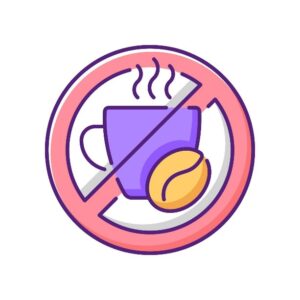
Caffeine is known to improve concentration, increase alertness, and elevate mood. However, it also increases cortisol levels in the body, which can result in anxious feelings, panic attacks, palpitations, and restlessness- even if you are not already prone to anxiety. Additionally, caffeine can disrupt the sleep cycle, a common sign of anxiety. If you are looking to manage your anxiety, it is recommended that you avoid or moderately reduce your caffeine intake.
- Music Therapy
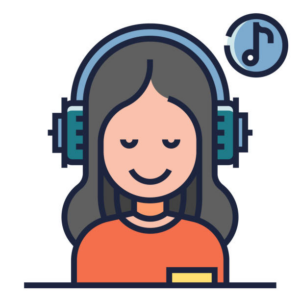
Listening to music can positively impact your mental and physical health, promoting relaxation and reducing anxiety symptoms. A study has shown the effectiveness of music therapy in reducing anxiety symptoms. So why not listen to your favorite music and enjoy a moment of calmness? Give yourself a chance to cool down and feel better.
- Social Rhythm

Maintaining a regular social rhythm, which involves going to bed and eating meals consistently daily, is crucial for maintaining good mental health. A study on college students revealed that irregular schedules, intensive learning periods, part-time jobs, and no lecture periods can negatively impact mental health. Maintaining a consistent social rhythm of activities throughout the day and night can regulate your mood and reduce the likelihood of anxiety.
Take Home Message
Disclaimer
If you enjoyed reading this article, please like, share, and comment. For any writing project, contact me here. Connect with me on LinkedIn for updates. You can also buy me a coffee to help me create new content. Thank you!

